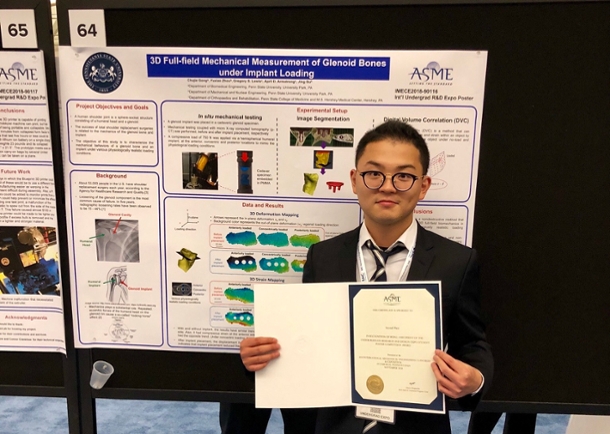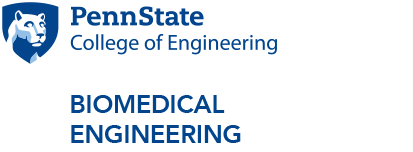
Chujie Gong at the American Society of Mechanical Engineers’ 2018 International Mechanical Engineering Congress and Exposition (IMECE) with his award-winning poster.
Chujie Gong takes second place in international poster contest
1/10/2019
UNIVERSITY PARK, Pa. — Chujie Gong, a senior majoring in biomedical engineering, recently won second prize in the undergraduate poster competition at the American Society of Mechanical Engineers’ 2018 International Mechanical Engineering Congress and Exposition (IMECE).
Gong’s poster, titled “Three-dimensional Full-Field Strain Mapping in Total Shoulder Replacement,” was based on research he conducted with the Penn State Mechanics and Materials Lab that addresses the most common complication in total shoulder replacement surgery, glenoid implant loosening.
The glenoid bone is the socket of the ball-and-socket shoulder joint, and the five-year loosening rate post-surgery is relatively high, anywhere from 15 percent to 44 percent. This is due to issues with the biomechanics of where the bone and implant connect.
Previously, measuring strains and load displacement on bones used a strain gauge, but this method only measures surface changes. Gong and other researchers have developed an improved system that combines mechanical testing with micro-x-ray CT scans, a type of high resolution CT scan that can measure mechanical changes inside a specimen.
Using a fresh-frozen glenoid specimen, the researchers conducted mechanical load tests while scanning the specimen, resulting in full 3D load strain mapping on the glenoid bone during testing. Micro-CT images of the specimen were taken before loading and after the load was stabilized. Then, a glenoid implant was cemented onto the glenoid bone and another series of the same tests and mapping were conducted under identical loading conditions.
This enabled Gong and his fellow researchers to identify strains and displacement on the entire specimen, both inside the specimen and on the surface, and how these strains and displacement changed with an implant in place. Being able to fully measure the differences in load strains and their effects have great potential for improving shoulder implants for patients such as those with arthritis.
“To better understand what the mechanics are like where the implant and shoulder connect, we need to study what's changed inside the shoulder bone when you put a load on it,” Gong said.
Jing Du, assistant professor of mechanical engineering and head of the Mechanics and Materials Lab, worked on the research project with Gong and said that this measurement method could result in improved implant design and treatment methods.
“By using our method, you can quantitatively measure the mechanics,” Du said. “This is not just guessing. Previously, doctors made judgements based on experience, but we can give quantitative insights now based on engineering.”
Being recognized for his research via second place at a prestigious engineering conference was not only an honor for Gong, but also a surprise. “This is a big honor, it was a big shock,” he said. “I'm a biomedical engineering student at a mechanical engineering conference, so that makes it kind of surprising.”
As one of Gong’s professors, Du said that she was not surprised that he won this award.
“He is very humble, and we know he is very good,” Du said. “This award is a very big encouragement for the team to continue their work. It’s good encouragement for everyone.”
Along with Gong and Du, others involved in the research included Yuxiao Zhou, doctoral student in mechanical engineering; April Armstrong, professor of orthopedics and rehabilitation; and Gregory Lewis, assistant professor of orthopedics and rehabilitation and assistant professor of mechanical engineering, bioengineering, biomedical sciences, and engineering science and mechanics.
This research was funded by a Penn State College of Engineering Research Initiative (CERI) scholarship and Erickson Discovery Grant from the Penn State Office of Undergraduate Education. Gong received travel support from the Office of Undergraduate Education and the College of Engineering’s Office of the Associate Dean for Education.



